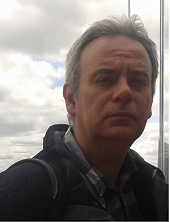![]() Plenary speakers
Plenary speakers
 Biosketch Antonio Camacho
Biosketch Antonio Camacho
Antonio Camacho PhD, is Head of Research at the Limnology Group at the Cavanilles Institute for Biodiversity and Evolutionary Biology and Full Professor on Ecology at the University of Valencia (Spain). Currently, his main research and university teaching is associated to basic and applied aspects of Aquatic Ecology. Basic research is mainly related to the functional ecology of lakes and wetlands and its interplay with climate change, as well as the microbial and molecular ecology and diversity of such ecosystems, including the biogeochemistry of the carbon cycle. Applied aspects of his research mainly deal with the development of methodologies for the evaluation of ecological status of lenític ecosystems and the conservation and restoration of aquatic ecosystems and water quality (from remote sensing to the molecular level), mainly related to European Directives such as the Habitats and the Water Framework Directives, as well as the enhancement of the role of Mediterranean wetlands in carbon sequestration. Apart of a dozen of research stays in Universities and Research Centres from Europe and America, he led five Antarctic and 1 Arctic expeditions with multinational teams. Dr Camacho is co-author of more than 180 research papers in peer-review scientific journals and books, as well as of near 300 papers presented in scientific meetings. He is nowadays the President of the European Federation for Freshwater Sciences, which lins national scientific societies on this discipline in Europe associating nearly 5,000 members, as well as the former Head of the Earth & Environmental Sciences Division of the European Academy of Sciences, and the former President of the Iberian Limnological Association.
Researchgate: https://www.researchgate.net/profile/Antonio-Camacho-4
WETLANDS FUNCTIONING AND CLIMATE CHANGE MITIGATION
Antonio CAMACHO
Cavanilles Institute for Biodiversity and Evolutionary Biology - University of Valencia, E-46980 Paterna, Valencia, Spain
Abstract
Climate change, forced by anthropogenic emissions of greenhouse gases (GHG), is currently the main challenge for human societies and our planet, which furthermore is enhanced by other anthropogenic impacts, e.g., land use changes. However, ecosystems, and particularly wetlands, can help in climate change mitigation. A deep understanding of biogeochemical cycles, and particularly of the carbon cycle, is necessary to achieve this alliance of humans and wetlands to face climate change. Some key research steps are needed: (i) knowing how the natural rates of GHG exchanges between wetlands and the atmosphere through life-mediated processes (i.e., photosynthesis, aerobic and anaerobic respiration, including methanogenesis) differ among wetlands of different characteristics, and how these fluxes are due to their different living compartments (plankton, benthos, emergent vegetation etc.); (ii) elucidating which are the main ecological factors (e.g. temperature, water chemistry, salinity, etc.) controlling these carbon exchanges and how they affect differentially the different carbon-related processes; (iii) determining to what extent other anthropogenic impacts (e.g. eutrophication, hydrological alterations, etc.) and the subsequent changes in the ecological/conservation status change the natural rates of wetland's carbon processes, thus influencing the carbon and global warming potential (GWP) balances of each specific wetland type; (iv) assessing the effect of specific management and restoration actions on the carbon and GHG exchanges in specific wetland types; (v) using the data gathered to create multilevel models that integrate the C-cycle, hydrology, and climate, to predict how driving factors (i.e., hydrological patterns, temperature, trophic status, salinity, etc.), including those related to the wetland conservation status (e.g. land uses in the catchment) can affect C and GHG fluxes, allowing to forecast the possible effect of human actions on C and GHG fluxes under different management-restoration-policy-climate change scenarios, and; (vi) design and implement specific actions and policies that apply the results obtained from this framework. In this talk, I will present the development of this multiscale research framework that we have developed with the purpose of enhancing the role of Mediterranean wetlands in climate change mitigation through wetland's carbon storage and GHG emissions, mediated by improved wetland management and restoration. This work was supported by projects CLIMAWET-CONS (PID2019-104742RB-I00) and WETLANDS4CLIMATE (LIFE19 CCM/ES/001235).
Keywords: Climate change mitigation, Wetlands, Biogeochemistry, Carbon and GHG, Modelling, Management and restoration

